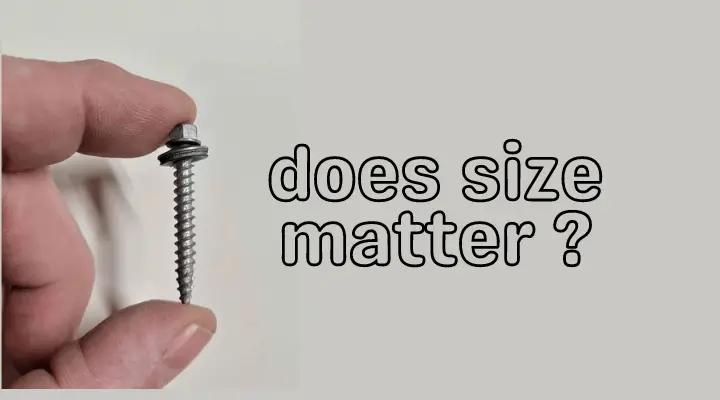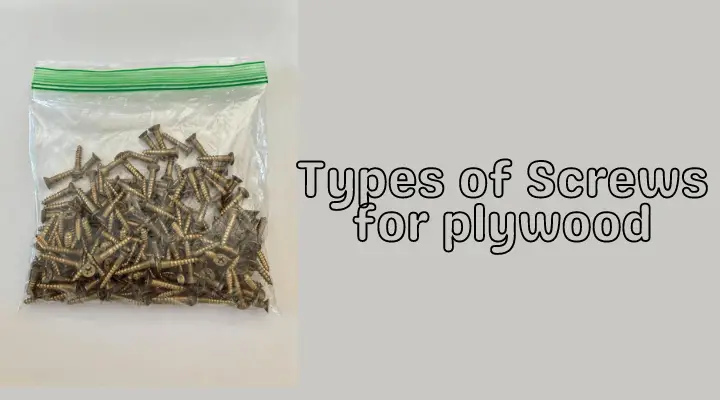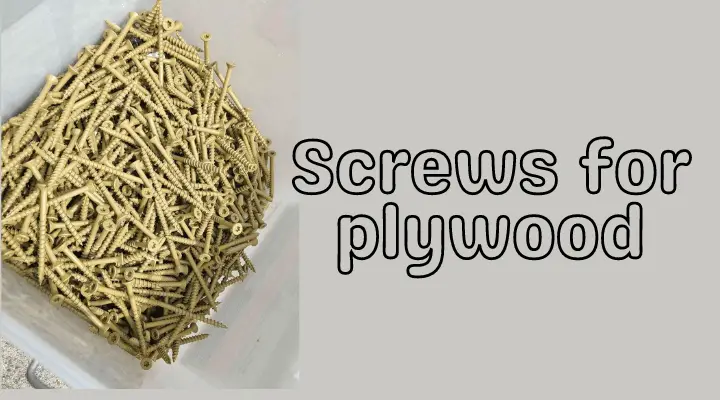Visiting the fasteners section of your local hardware store is arguably one of the most intimidating experiences of a woodworker’s life. You are required to choose a few screws from a gazillion options, making this a very hard nut to crack. It becomes even worse when looking for screws to use on plywood, given the material’s thin, delicate nature compared to ordinary timber.
Lucky for you, this article seeks to set the record straight. We will take an in-depth look at the different types of screws that you should use for plywood, as well as the ins and outs of choosing the best screws for plywood that fits your intended project.
Recommended Reading: Sande plywood an overview
The Power Pro Premium Exterior Wood Screws are a great option for decking projects. They are made from a corrosion-resistant alloy that is coated with bronze epoxy to provide superior rust and corrosion protection. The screws also have a self-starting tip that offers 20% faster engagement into wood, reducing the risk of splitting. Additionally, the screws have a unique star drive technology that virtually eliminates cam-out, ensuring a smooth and effortless drive every time. The 5lb tub contains approximately 501 pieces, which is enough for most decking projects.
Why You Should Not Use Nails for Plywood
Despite being the most common type of fasteners, nails do not function properly when used on plywood. The reason being nails work as compression fasteners, a functioning model that does not bode well with plywood. They puncture the wood and drive timber fibers apart to make the hole. In response, the wood fibers push back against the nail, thereby bringing about compression. This process is not viable for plywood as the thin layers of wood are not strong enough to withstand the compression force, causing them to disintegrate and the plywood to split.
Why Use Screws?
On the other hand, screws and plywood are a match made in heaven since the former do not require compression to hold onto the wood. Instead, the threads gently create their distinct channels as they cut their way into the plywood. This way, the threads lock themselves onto the plywood, ensuring a formidable fastening bond and reducing the risk of damage to the wood.
Noteworthy, it is advisable to pre-drill the plywood using an undersized shank to ensure the screw gets a firm bearing and snugly fits into the plywood. This is an important step in plywood screwing as it protects the material from excess stress, which can lead to splitting.
Does size matter? Plywood Screws
Size is one of the most fundamental factors to consider when choosing the best screws for your plywood. It goes without saying that you will need screws that complement your plywood’s size. In this regard, you should specifically consider:

Screw Size (Diameter)
A screw’s diameter determines the width of the hole it threads. To prevent exposing the plywood to split-causing stress, narrower diameters should be used on smaller plywood while wider diameters should be used on bigger plywood.
The most common screw diameter sizes in the U.S. include #6, #8, and #10. The larger the number, the wider the diameter.
Length of Shank/Threads
The size of the screw should be appropriate for the thickness of the plywood. For example, if you are using 1/2″ plywood, you should use 1-1/4″ screws
With that in mind, the best sizes for different plywood’s are detailed in the table below.
| Plywood | Screw Size | Length |
| 12 mm | #6 | 1-⅝” |
| 18 mm | #6 | 1-¾” |
| 1/2 | #8 | 1-¼” |
| 3/4 | #8 / #10 | 1-¼” / 2” |
Other Considerations
Countersink
Countersink refers to when the screw sinks into the wood’s surface, resting flush. This factor is integral in cases where you want to conceal the fixtures while maintaining the wood’s integrity, such as in shelves or tables.
Herein, you should consider the screw size when countersinking. Ideally, the countersinking screw should be around 50% bigger than the target hole’s diameter.
Case in point, if you are pre-drilling using ¼” screws, the countersink should be 3/8”. The rationale here is that ¼ multiplied by 1.5 is 3/8. By and large, the countersink needs to be bigger than the hole.
Material
Another vital consideration is the material used to manufacture the screws. There are steel, bronze, brass, and aluminum screws available in the current market.
Steel is by far the best material for plywood and other woods, as opposed to other softer metals. This material is specifically designed to withstand the stress of getting driven into wood, especially by power tools.
Coating
Screws are available with a variety of coatings. The most common coatings are zinc, galvanized, and stainless steel. Zinc and galvanized coatings are rust-resistant, while stainless steel is corrosion-resistant.
Head
There are several different types of head styles available for screws. The most common head styles for plywood are flathead, oval head, and Phillips head. Flathead screws are best for countersinking, while oval head screws leave a small dome on the surface of the plywood. Phillips head screws are the most common type of head style and are easy to use with a screwdriver.
Types of Screws for Plywood

Given the factors detailed above, it is evident that you should use coated screws made from steel on plywood as they offer maximum durability. However, when it comes to performance, your choice of screw will largely depend on the intended use.
For instance, while some plywood screws have the traditional Phillips head, heads with star or square drives are more ideal for use with power tools.
Either way, let’s take a look at the different types of screws meant for plywood use available in the current market, and their pros and cons.
Standard Wood screw
These are affordable and readily available wood screws in the current market. They feature a smooth shank just below the head and a threaded section.
The primary drawback of these screws is that those in the American market are only available with the traditional Phillips head. This head style tapers off when used with power tools. Although not available in the current market, the best standard wood screws are those with square or star drives for optimal bonding with drill bits.
Drywall Screw
Compared to standard wood screws, drywall screws are more affordable and can be found in any retail hardware store. Their shanks are significantly thinner and are threaded all the way through.
Due to their thinness, drywall screws are prone to breaking or snapping. Their brittle nature limits them to lightweight projects.
Another notable disadvantage is that they also have Phillips heads, with a bugle style. This implies that the Phillips head is curved inside to help the screw sink to the head’s depth without countersinking.
Deck Screws
Also known as the exterior screw, deck screws are designed for use in outdoor constructions. Their suitability for such projects stems from their rust-resistant coating and hardened steel for added durability. See: Best screws for outdoor use
Additionally, deck screws are mostly available with flatheads, making them ideal for countersinking.
Multi-Purpose Screws
Also called production screws, these are modern variants designed to replace drywall screws. They are made from hardened steel and have square or star drives to prevent your driver from slipping out during drilling.
More importantly, multi-purpose screws also come fully equipped with self-drilling points at the bottom of their threaded shanks. These points ensure the screws are capable of driving into wood without the need for a pilot hole or pre-drilling. Ideally, it allows for convenient screwing.
The only drawback is that these screws are very costly.
Best Screws for Plywood
Based on the breakdown above, deck screws stand out as the best screws for plywood. Not only are they rust-resistant, but they are also made from hardened steel and feature flatheads. Additionally, they are affordable.
For those who do not mind spending big on screws, multi-purpose screws would make for the perfect choice.
However, the choice of best screws goes beyond the type of screw. You also need to consider a size that best fits the needs of your plywood size.
Power Pro 48610 Wood Screws
The Power Pro Premium Exterior Wood Screws are a great option for decking projects. They are made from a corrosion-resistant alloy that is coated with bronze epoxy to provide superior rust and corrosion protection. The screws also have a self-starting tip that offers 20% faster engagement into wood, reducing the risk of splitting. Additionally, the screws have a unique star drive technology that virtually eliminates cam-out, ensuring a smooth and effortless drive every time. The 5lb tub contains approximately 501 pieces, which is enough for most decking projects.
They are coated with bronze epoxy for state-of-the-art corrosion and rust protection, meaning you can use them for outdoor purposes. They also feature a self-starting tip for faster driving and to avoid wood splitting. Noteworthy, Power Pro screws are available in various sizes.
Conclusion: Best screws for plywood
In conclusion, there are many factors to consider when choosing screws for plywood. The most important factors include the size, material, coating, head type, and intended use of the screws.
For general use, deck screws are a good option. They are rust-resistant, made from hardened steel, and have flatheads. They are also relatively affordable.
For those who do not mind spending more, multi-purpose screws are a good choice. They are made from hardened steel, have square or star drives, and come with self-drilling points. This makes them easy to drive into wood without the need for a pilot hole.
No matter what type of screws you choose, it is important to pre-drill the plywood to prevent splitting. This is especially important for thinner plywood.
I hope this article has helped you choose the best screws for your plywood project. Thank you for reading!


